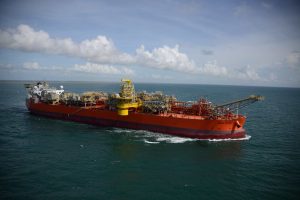
Following the Deepwater Horizon incident in 2010, the Marine Well Containment Company (MWCC), a consortium of the world’s leading oil companies was created to mitigate risks relating to drilling and extraction activities in the US Gulf. The main objectives of MWCC is to provide tangible controls and a reliable pollution response capability, available for immediate deployment, should anything similar ever happen again.
Critical to this rapid response system are two modular capture vessels (MCVs), developed, owned and operated by AET under a 20-year contract to the MWCC. AET’s MCV’s, Eagle Texas and Eagle Louisiana, are designed to provide an immediate response to any damaged subsea well in a cap and flow scenario, by capturing, processing, storing and offloading liquids from the well site.
The challenge
The turret system design for the MCVs was undertaken by Bluewater BV and incorporates a heading control system to maintain the riser in a stationary position during vessel motion and an emergency release mechanism to detach a buoy, which holds the riser and utility umbilical, in extreme weather or on loss of station control of the vessel. Taranto Consultancy was engaged to perform a reliability analysis on both the heading control and release systems in order to ensure that they met the required Safety Integrity Levels (SIL).
The Solution
The heading control and drive system was subject to a FMECA in order to provide the following:
- An evaluation of the failure characteristics of the equipment in order to identify any
areas for design improvement or single failures which could lead to an unsafe
condition or an event with significant financial impact. - The basis for reliability analysis of critical functions.
- The basis for development of a safety and cost effective maintenance programme
Using the FMECA as a guide, a Fault Tree Analysis was performed for the turntable drive failure to operate while in auto mode as this is considered to be the most demanding requirement for the system and involves the largest number of system components.
A Fault Tree Analysis was performed for events associated with the failure of the disconnect sequence.
The Result
Working closely with the design team, the FMECA and FTA work enabled potential design weaknesses to be eliminated before build and demonstrated that the final designs were robust and met all safety and reliability requirements.
